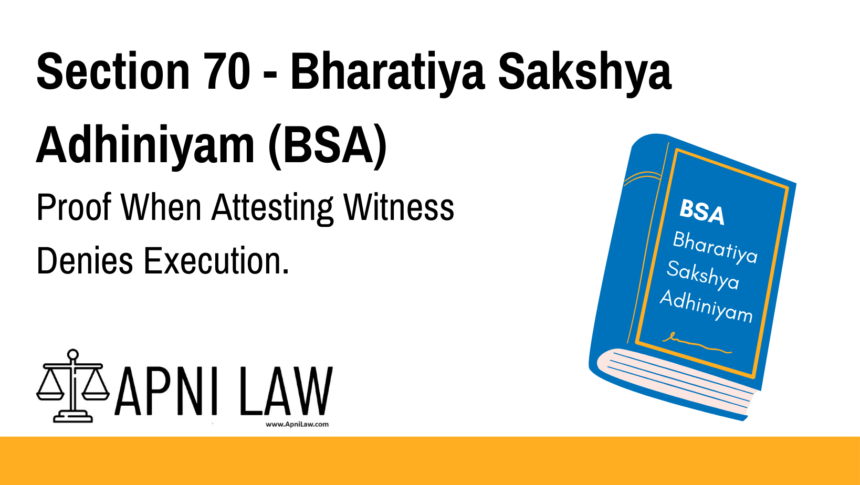Code: Section 70 – Bharatiya Sakshya Adhiniyam, 2023 (BSA)
If the attesting witness denies or does not recollect the execution of the document,
its execution may be proved by other evidence.
Explanation of Section 70 BSA
Section 70 of the Bharatiya Sakshya Adhiniyam addresses a specific situation in the proof of attested documents — where an attesting witness either denies execution or is unable to remember it.
Typically, as per Section 67 BSA, a document required by law to be attested must be proved by calling at least one attesting witness. However, complications arise when the attesting witness:
-
Denies witnessing the execution of the document, or
-
Does not recollect the execution of the document.
In such circumstances, Section 70 allows for flexibility: the execution of the document can be proved through other forms of admissible evidence.
This section ensures that the evidentiary process does not break down merely because a witness is uncooperative or forgetful.
Key Principles:
-
Applies only when a witness denies or fails to recollect the act of execution.
-
Opens the door for secondary evidence (such as expert opinions, other witnesses, or circumstantial evidence).
-
Maintains fairness and prevents technical obstruction to justice.
Illustration
Example:
A registered gift deed is brought to court, and one of the attesting witnesses is summoned. However, the witness says they do not remember witnessing the document or outright denies it.
Under Section 70, the person relying on the deed can still prove its execution using other evidence — such as:
-
The handwriting of the parties,
-
Testimony from someone present at the time,
-
Circumstantial evidence showing acceptance of the gift.
Common Questions and Answers on Section 70 BSA
-
What happens if an attesting witness denies the execution of a document?
In such cases, Section 70 allows the party to prove the execution of the document using other evidence.
-
What kind of “other evidence” is acceptable?
Other evidence may include expert handwriting analysis, corroborating documents, witness testimonies, circumstantial evidence, or even admissions by the party concerned.
-
Does this mean attesting witnesses are no longer important?
Not exactly. Attesting witnesses are still the primary mode of proof under Section 67. Section 70 only applies when they are unable or unwilling to confirm execution.
-
Can both attesting witnesses be bypassed under Section 70?
Yes, but only if both deny or fail to recollect execution. In that case, other evidence can be relied upon.
-
Is this applicable to all types of attested documents?
Yes. Section 70 applies broadly to all documents required by law to be attested, including wills, gift deeds, and mortgage documents.
Conclusion
Section 70 of the Bharatiya Sakshya Adhiniyam provides an important safeguard in the evidentiary process, ensuring that a document’s validity is not automatically dismissed due to witness denial or memory failure. By allowing other forms of proof, this provision reinforces the principle that substance should prevail over form in judicial proceedings.
To learn more about evidentiary procedures and document verification under Indian law, visit ApniLaw.








